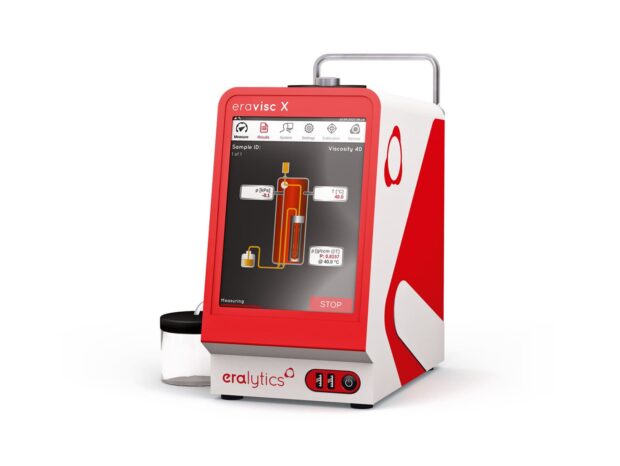Standard Test Method for Kinematic Viscosity of Transparent and Opaque Liquids (and Calculation of Dynamic Viscosity).
Get more information about the standard at ASTM D445-24.
ASTM D445 is a globally recognized standard for determining the kinematic viscosity of transparent and opaque liquids, including petroleum products. This method measures the time it takes for a liquid to flow through a calibrated glass capillary viscometer under the influence of gravity at a controlled temperature. The kinematic viscosity, expressed in centistokes (cSt), is a fundamental property that influences the performance, efficiency, and handling of liquid hydrocarbons and related products.
Details
The method described in ASTM D445 ensures precision and repeatability by using strict protocols for temperature control and measurement. The procedure involves preparing the sample to ensure homogeneity, introducing it to a viscometer, and timing its flow under gravity. The result is calculated by multiplying the flow time by the viscometer constant, providing an accurate measurement of the liquid’s resistance to flow.
Testing is typically performed at standard temperatures such as 40°C or 100°C, aligning with industry requirements. Kinematic viscosity is a key parameter for predicting how a liquid behaves under different conditions, impacting flow, lubrication, and heat transfer. ASTM D445 provides a reliable, standardized method for evaluating this critical property, supporting safety, performance, and compliance in diverse industries.
Industries & Applications
ASTM D445 is widely applied across industries where understanding a liquid’s viscosity is essential for safety, performance, and operational efficiency:
- Petroleum (Oil and Gas): Evaluates the viscosity of fuels, lubricants, and greases to ensure optimal performance and compliance with specifications
- Automotive and industrial lubricants: Determines the flow characteristics of oils used in engines, gearboxes, and machinery, influencing wear reduction and energy efficiency
- Hydraulics: Ensures that hydraulic fluids meet the viscosity requirements for efficient energy transfer and system reliability
- Aviation and marine: Verifies the suitability of fuels and lubricants for use in aircraft and marine engines under extreme operational conditions
- Paints and coatings: Measures viscosity to ensure proper application, drying performance, and product consistency
- Quality control and manufacturing: Regularly employed in laboratories for monitoring product consistency and adherence to industry and regulatory standards
